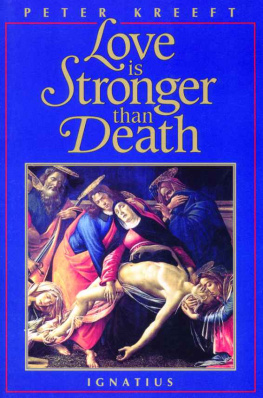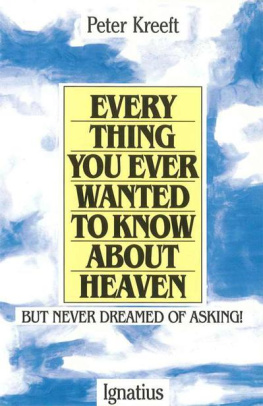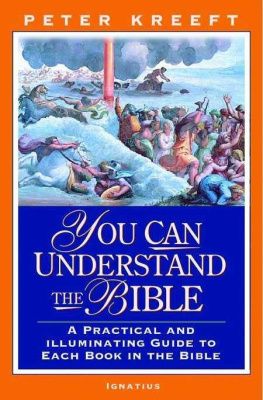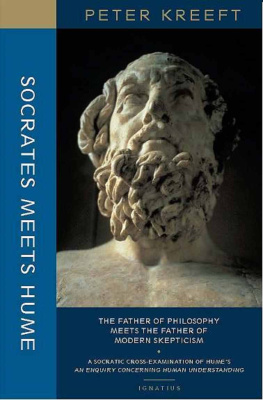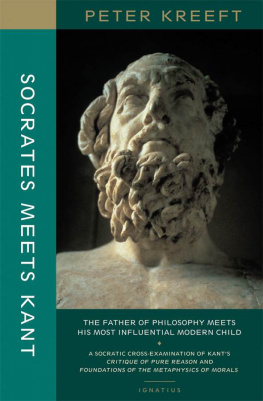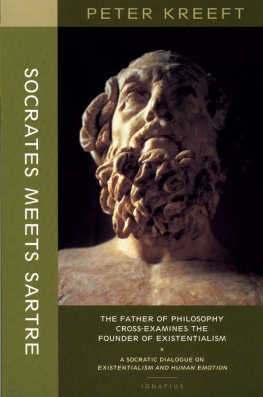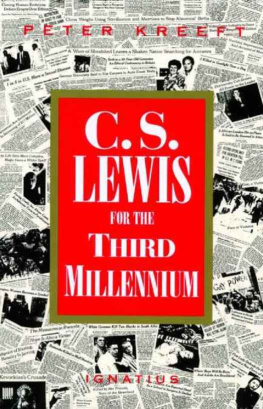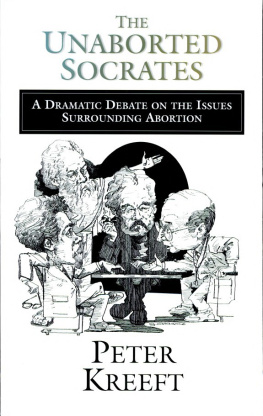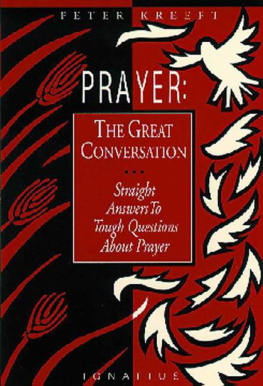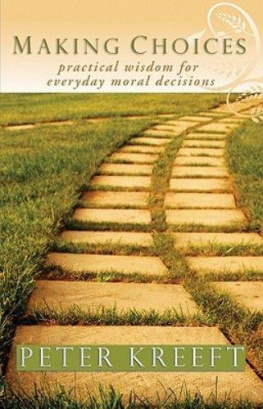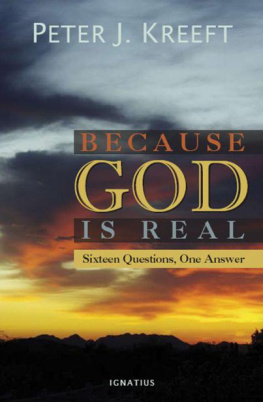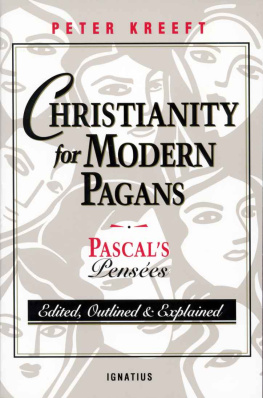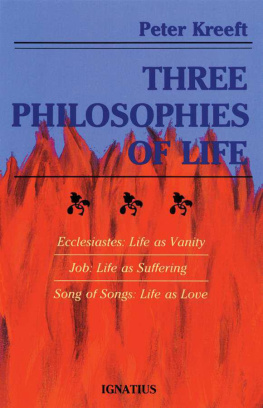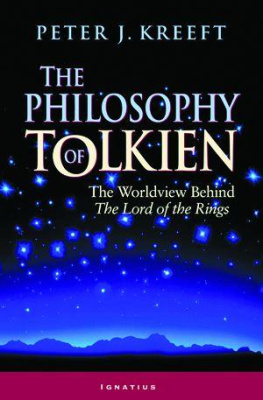Peter Kreeft - Love Is Stronger Than Death
Here you can read online Peter Kreeft - Love Is Stronger Than Death full text of the book (entire story) in english for free. Download pdf and epub, get meaning, cover and reviews about this ebook. year: 1992, publisher: Ignatius Press, genre: Religion. Description of the work, (preface) as well as reviews are available. Best literature library LitArk.com created for fans of good reading and offers a wide selection of genres:
Romance novel
Science fiction
Adventure
Detective
Science
History
Home and family
Prose
Art
Politics
Computer
Non-fiction
Religion
Business
Children
Humor
Choose a favorite category and find really read worthwhile books. Enjoy immersion in the world of imagination, feel the emotions of the characters or learn something new for yourself, make an fascinating discovery.
- Book:Love Is Stronger Than Death
- Author:
- Publisher:Ignatius Press
- Genre:
- Year:1992
- Rating:4 / 5
- Favourites:Add to favourites
- Your mark:
- 80
- 1
- 2
- 3
- 4
- 5
Love Is Stronger Than Death: summary, description and annotation
We offer to read an annotation, description, summary or preface (depends on what the author of the book "Love Is Stronger Than Death" wrote himself). If you haven't found the necessary information about the book — write in the comments, we will try to find it.
Peter Kreeft: author's other books
Who wrote Love Is Stronger Than Death? Find out the surname, the name of the author of the book and a list of all author's works by series.
Love Is Stronger Than Death — read online for free the complete book (whole text) full work
Below is the text of the book, divided by pages. System saving the place of the last page read, allows you to conveniently read the book "Love Is Stronger Than Death" online for free, without having to search again every time where you left off. Put a bookmark, and you can go to the page where you finished reading at any time.
Font size:
Interval:
Bookmark:
Love Is Stronger Than Death
PETER KREEFT
IGNATIUS PRESS SAN FRANCISCO
Originally published by Harper and Row, New York
Dirge without Music is quoted from Collected Poems
1928, 1955 by Edna St. Vincent Millay
and Norma Millay Ellis, Harper and Row
Cover by Riz Boncan Marsella
Cover art credit: SCALA / Art Resource, New York
Lamentation
Botticelli (ca. 1495)
Munich
Alte Pinakothek
Published 1992, Ignatius Press, San Francisco
1979 Peter Kreeft
All rights reserved
ISBN 978-0-89870-392-4 (PB)
ISBN 978-1-68149-314-5 (EB)
Library of Congress catalogue number 91-76753
Printed in the United States of America
For my father and my mother,
from whom I learned the
meaning of death and life .
About This Book
Three Questions: Death, Life and God
Death Is an Enemy / Death Is Loss / Death Is Not Sleep / The Appearance of Death vs. the Reality of Death / Death Is Loss of Light / Death as Inevitable / Death as Irreversible / Despair / A Puzzle: The Heart / Following Up the Glue: Death as Exceptional / Death and Guilt / A Thought Experiment / Hope / Notes
Hate versus Indifference / Why Not to Bury the Dead / Premodern Mans Fascination with Death / The Modern Christian Ignoring of Death / The Modern Post-Christian Ignoring of Death: Collectivism, Skepticism, Relativism, Technologism, Hedonism, Externalism / The Pornography of Death / Jaws as Death / A Dilemma and a Dead End / An Escape from Escapism / Notes
Our Being-Toward-Death / Openness / A Frame for Life / Appreciation of Life / Death as Food / Death and Truth / Death and Heroism / Friend or Enemy: An Unresolved Riddle / Notes
Doors / Death as a Door / A Thought Experiment: Death as Birth / Little Deaths / The Process of Dying & Being Born / Returnees from Death? / Life as Fetal Rehearsals / The Freedom of Death / An Argument for Immortality / The Ecology of Death / Wombs Within Wombs / Death Is Not Separation / Union with the World Through Death / Why We Must Die / Death Weans Us from Death / Death as an Operation / Notes
A Strange Experience / The Individuality of Death / My Divine Name / Free Death / Choosing Life / Death Is Not Passive / Meeting / Sex and Death / How Do You Meet Death? / Meeting Light / Judgment / Heaven and Hell / The Consummation of the Quest / Ultimate Meaning or Ultimate Meaninglessness / If Death Is So Great, Why Not Suicide? / Prayer and Death / Im So Happy I Could Die! / Love Is Stronger Than Death / The End / Concluding Unscientific Postscript / Notes
Dear, beauteous death! the jewel of the just,
shining nowhere but in the dark;
What mysteries do lie beyond thy dust,
Could man outlook that mark!
HENRY VAUGHAN (16221695),
They Are All Gone into the World of Light
Death is the one implacable topic. We mortals (mortalsthere it is!) can never stop thinking about it. We can never stop trying to do something about it. Indeed, it seems to have been one of the first things we did try to do something about. Dig as far as we will into archeological mounds in Mesopotamia, Africa, or Sutton Hoo, and we findwhat? Burial artifacts. Coffins, spices, food and armor for the soul on its journey, memorial tabletssomething, anything, to bring to this impalpable mystery. Ubi sunt? Indeed.
No. I am wrong. We can stop thinking about it. Our own epoch tried it. We spread euphemism over it like treacle. Instead of howling wakes, long palls, drawn hearses, and Dies Irae, we tried parlors and carpets and slumber rooms and cosmetics and the fetching imagery of Forest Lawn with its nooks and glades and general ambience of babys-boats-a-silver-moon. All is well, all is well, if only we dont look . (Said in a tone quite different from the Lady Julian, who, having looked quite long and hard, was able to say with towering courage and candor, All shall be well, and all shall be well. Not the same thing at all.)
But no again. I am not wrong. We cant stop thinking about it. Suddenly (ten years ago?) we decided that, since we are bringing the clipboards and questionnaires of society to every other topic, we may do so with this topic. So we briskly set about approaching the ultimate monster in the same way. Lets see now, lets tabulate the progressive attitudes of the dying person. And lets calculate the responses of those surrounding the situation. And lets enumerate and observe and tally and summarize and generalize. It is data , and our specialty now is data. Sex data, marriage data, urban data, data about syndromes and neuroses and hostilities and attitudes and prejudices. If only we can get it all taped somehow....
And thus a plethora of books about death. One more topic. How to die.
And all the while the monster is grinning at us, unimpressed, implacable, inexorable, gobbling us up one by one while we whisk at the gnats flying about his serene brow. He is still our enemy.
So says Peter Kreeft. There is no getting around it; there is no point in sentimentalizing it; nothing is to be gained by artful dodges. Death is our enemy, our last enemy. Aha. Bravo to Peter Kreeft for pricking us back toward the sheer lucidity with which our ancestors looked at death.
And then what? Death is a stranger, he says. Yes, fair enough. It certainly is. So far so good. But whats this? Death as a friend? Wait, are we being wheedled into yet another mire of sentiment? Will we find the abyss once more papered over with febrile attempts to make death natural and therefore unterrifying and welcome?
Oh, oh, worse and worse. Death as mother. And, final, frantic outrage, death as lover. Well, we can set this book aside as one more attempt (albeit an enormously keen and ingenious attempt) to tiptoe past the intractable.
No. I am wrong indeed this time. This book prods and huddles us along a track right down into and through the dark mystery of death, never winking, never dodging, never flinching, never bidding us avert our eyes. We are driven (that is the word, I thinkPeter Kreeft will not allow us to loiter timorously in byways where we might be pleased to find false shelter), driven much farther into the topic than the books-about-death have dared take us. Follow Peter Kreeft in this journey into the abyss and find out how to begin thinking about it with a candor born of true radicalism, that is, the effort to get to the rootthe radix of a question.
Death as friend? As mother? As lover? How can we say that without the most insufferable sentimentalism? Read this and find out.
Thomas Howard
Hamilton, Mass.
Epiphany 1978
I am writing this book about death for an intensely personal reason. I have a terminal illness.
You are invited to read it for the same reason. You too have a terminal illness.
We are never mistaken in our prognosis of this illness: Life is always fatal. No one gets out of it alive. As doctors, when they examine the state of a patient and recognize that death is at hand, pronounce: He is dying, he will not recover, so we must say from the moment a man is born: He will not recover.
I invite you to a journey of exploration with me into the land of death, the undiscovered country from whose bourn no traveller returns. We live in this country, and we should know the country we live in. We should discover the undiscovered country.
It is a mysterious country, an impenetrable jungle, a bottomless pit. The questions What is death? and Why do we die? are the deepest of all questions. They are questions the poet, the philosopher, the mystic, and the child ask; and they are questions the poet, philosopher, mystic, and child in each of us asks. We keep asking. We obviously have not yet finished answering. Death still smiles sphinxlike at us. We have not unravelled her riddle. There is little danger that this book will. Its purpose is to stimulate exploration, not to end it. Perhaps the only thing that is clear about death is that we cannot be clear about it. Perhaps the only wisdom we can have about death is Socratess wisdom, the knowledge of our own ignorance. That is at least where we have to start.
Next pageFont size:
Interval:
Bookmark:
Similar books «Love Is Stronger Than Death»
Look at similar books to Love Is Stronger Than Death. We have selected literature similar in name and meaning in the hope of providing readers with more options to find new, interesting, not yet read works.
Discussion, reviews of the book Love Is Stronger Than Death and just readers' own opinions. Leave your comments, write what you think about the work, its meaning or the main characters. Specify what exactly you liked and what you didn't like, and why you think so.

